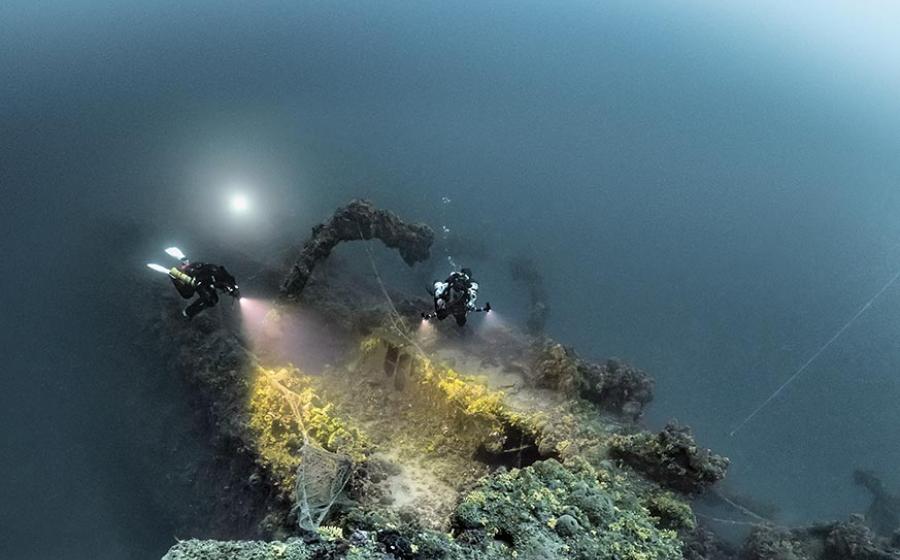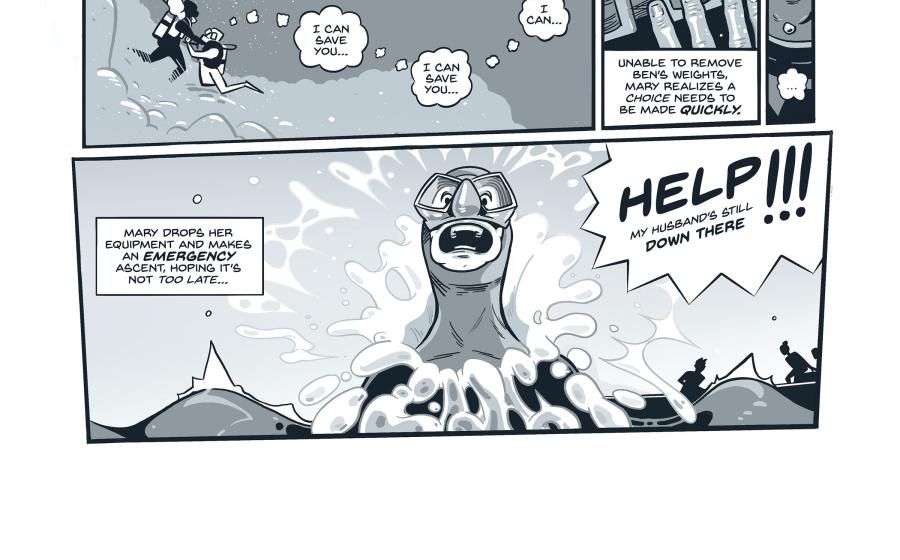How to Rescue Yourself
Nothing beats a good dive buddy, especially in an emergency. Having a second option for everything — air, equipment, brains — can be the difference between a close call and tragedy. That’s why buddy diving has been fundamental since the origins of recreational diving. But let’s be honest. Do you always dive within easy reach of your buddy?
As we progress through our diving experience, many of us grow more cavalier, venturing off on our own, unconcerned about the value of redundant safety protocols and good old fashioned teamwork. Solo diving is becoming more popular among advanced divers and accepted by operators around the world. But before you decide to head off on a solo mission, you’ve got to become self-reliant.
“Divers seem to do away with the most basic but most important self- rescue techniques once they complete their open-water course,” says Jen LeBlanc, a PADI Master Instructor and Handicap Scuba Instructor who works at Sam’s Tours in Palau, where wild currents and steep walls can present challenging conditions. “The simplest of tasks, such as setting up and checking your own equipment, can be the difference between a minor issue and a major problem.”

Alex SherSave yourself with self rescue techniques.
According to Steve Tippetts, senior instructor at Divetech in Grand Cayman: “A self-reliant diver is a safe and competent diver. If divers are able to rescue themselves, they become an asset to more-complicated emergency scenarios. Unfortunately there are too many divers who have elevated opinions of their own abilities because they have not necessarily experienced difficult situations. If self rescue is addressed, it may change their perspective.”
To avoid the complacency that can lead to life threatening situations, our experts have some simple tips to start working your way to self-sufficiency.
IDENTIFY THE CHALLENGES
Equipment malfunctions, strong currents, silt-outs, and lost buddies are only a few of the dangerous situations you need to get yourself out of on any given dive. Knowing what to do when it happens can be learned the hard way, or more safely through advanced training such as rescue-diver courses, not to mention gleaning best practices from more-experienced divers.
“You can learn to anticipate scenarios by roleplaying and having focused discussions with buddies and local pros about what they’ve seen or experienced, how it was handled, and what could have been done differently,” LeBlanc says. “Not evaluating the extent of a problem and all possible implications is one of the most common mistakes divers make when faced with a crisis, along with just wading in without fully thinking about the consequences,” says Tippetts.
MASTER YOUR SKILLS
Simply learning to perform the required skills to pass your rescue-diver class is not enough to become truly self-sufficient. “Practice, practice, practice — remove and replace your mask, work on your buoyancy, deploy your SMB, set up your equipment with your eyes closed,” says LeBlanc. “Anything you can do to make the fundamental elements of safe diving second nature will benefit you in emergency situations.” “Get as much experience as you can in as many different environments and conditions as possible,” says Tippetts.
“Unfortunately too many divers carry out the skills of a course and then do not practice them ever again,” he explains. “The only way we can ensure that we retain a deeper competence of a skill is by going back and practicing the skill in a number of different scenarios in a safe environment, with a buddy. My personal training motto is ‘Train hard, dive easy.’ ”
KNOW YOUR GEAR
Many diver emergencies are a result of an equipment failure. By developing an intimate relationship with your kit in controlled environments such as a pool, you’ll be better able to problem-solve at depth. And be sure to spend lots of time with any new items before putting them to the test in the wild, especially dive computers and other complicated instruments.
Emergency Signaling Gear Tested and Reviewed by ScubaLab
“Don’t rely on a buddy or guide to set up your gear for you, because you begin to forget some of the most basic fundamentals if someone else always does it for you. You can’t expect to handle an equipment malfunction underwater safely if you don’t remember how things work,” LeBlanc says. “Have your gear serviced by a qualified professional on a regular basis, and don’t be stubborn and hang on to that computer, BCD or regulator from the ’80s or ’90s because, like everything else, scuba equipment evolves and real advances have been made to increase comfort and safety.” “There’s a fine line between ensuring you have redundancy and taking too much equipment, so make sure every piece is fi t for a purpose,” Tippetts says. “Situations that require self-rescue can be so diverse, and carrying a tool or specific piece of equipment for each and every one would soon have you looking like a Christmas tree. The most effective piece of specialized equipment is common sense and the ability to not panic.”
FIND YOUR CALM
Panic is the most dangerous threat you’ll encounter underwater; the most fundamental tool for self-rescue is your own mind. Only by getting your skills, equipment and dive plan completely wired can you achieve the capacity to handle most any emergency situation. “Stop … think … act,” says LeBlanc. “I’m sure you’ve heard this a million times, and there’s a reason for it. No matter what the crisis — exhausted trying to keep up with your buddy or entangled in line on a wreck — the adrenaline kicks in and you begin to breathe hard. The simple act of stopping calms the mind, relaxes the heart, and allows you to think more clearly and find your ‘happy place’ instead of
feeling stressed underwater.
“I believe that mantra should be introduced during the very first certification, as it allows us to condition our responses,” says Tippetts. “I am a great believer in visualization, and I teach it as a tool in all my technical courses, explaining it as though you’re playing a movie in your mind of how you are going to conduct the dive, step by step. So, if something happens that does not follow the script you have rehearsed, the mind and body potentially has a split-second advantage to react to the situation.”










